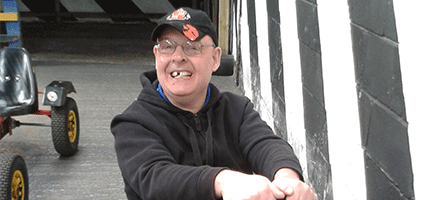Leaving an Assessment and Treatment Unit – Alan’s journey
Sharing a home with other people is a major trigger for Alan’s behaviours of distress so, when Dimensions supported him to move out of an assessment and treatment unit (ATU) and into his own home, he stopped intimidating others and started enjoying his life.

Alan is in his fifties. He lives with autism, moderate learning disabilities, obsessive compulsive disorder and bi-polar disorder. Living with others caused anxiety and challenging behaviour, putting a strain on the support service and his house mates.
While living in residential care Alan found it very difficult to share his home with other people – his compulsions to make other people drinks and keep the building clean couldn’t be fulfilled. He displayed his anxiety through behaviour that challenges, affecting himself, his staff and his house mates. His support provider couldn’t cope with his severe behaviours of distress so he was transferred to sheltered accommodation.
While in sheltered accommodation Alan’s anxieties increased. Without regular support he tried to make contact with his neighbours, sometimes forcing his way into their home. His behaviour became destructive and he started trying to flood his home. After threatening his neighbours the police intervened. Alan was moved to an assessment and treatment unit.
The assessment and treatment unit was no home for Alan, his anxieties increased and behaviours became more difficult. We got to know Alan and involved one of our specialist behaviour support analysts, to assess what would give him the best possible chance of success.
We had been told that this was Alan’s last chance to live in the community and that he may spend the rest of his life in a secure unit. With the backing of his psychologist and psychiatrist, and the treatment unit, the local authority agreed to Dimensions’ proposal to move Alan into his own home.
Since our Behaviour Support Team stepped in, Alan has only shown nine instances of distressed behaviour.
We started his support gradually – our behaviour support team initiated the process by carrying out a functional behaviour assessment and developing a personalised behaviour support plan.
Angie, Alan’s support worker, was with him at the ATU before Dimensions took on his support. Angie has carried on supporting him and is still working with him now.
To help with the transition his new manager spent time with him at the ATU and they worked together to create a personalised advert for support staff. The team shortlisted candidates who spent some time with Alan before being appointed, so that he could choose who he wanted to work with him.
When the support team were in place we trained them in person-centred thinking, how to implement his support plan and the best options for minimising his challenging behaviour.
Alan soon moved out of the ATU and into his own home.
In the first three years of support from Dimensions Alan’s behaviours of distress has reduced drastically – he’s happy in his own home, keeps it clean and spends his leisure time at a local life skills group and at football matches.
